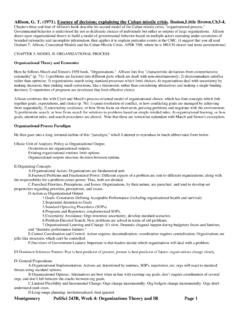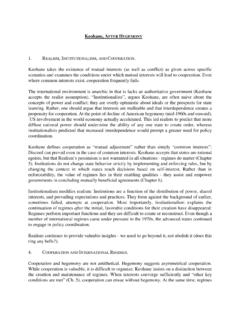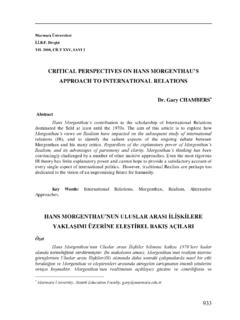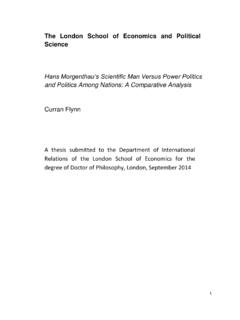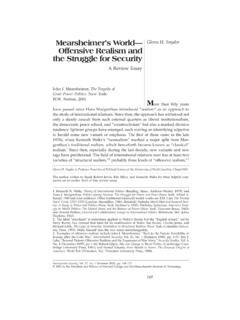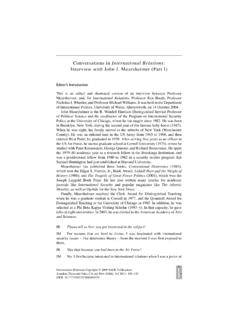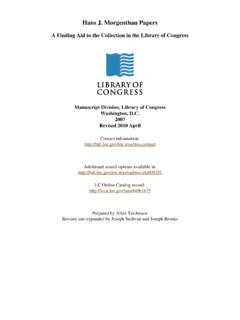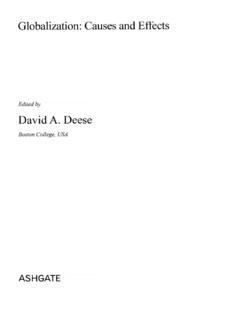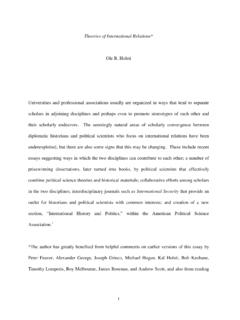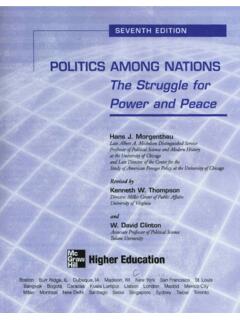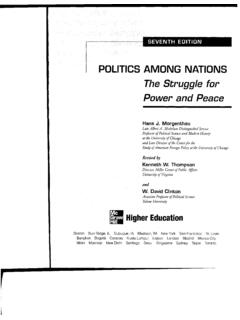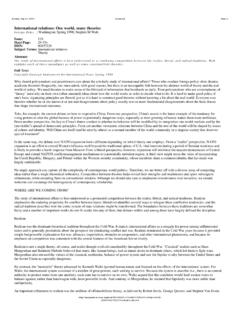Transcription of nation state. Finally, realists believe that the world may ...
1 Hans Morgenthau, politics among nations : The Struggle for Power and Peace (NewYork: Knopf, 1960), pp. 3-15, 228-235 Morgenthau is ambitiously extolling the virtues of his realist theory on the nature of allpolitics. He begins by contrasting it with moralist/idealist theories, and states that tojudge between two such diametrically opposed theories, one must determine which is consistent with the facts and within itself. According to Morgenthau, Moralist/Idealists believe in a rational and moral politicalorder, derived from universally valid abstract principles, and that with a little more knowledge and understanding human beings can achieve this order (3). In contrast, realists believe that the world is divided by opposing interests, leaving moral principlesimpotent, unless political entrepreneurs are able to balance these interests in a mannerthat approximates morality. Much of their differences come from their divergent viewsof human nature idealists believe humankind is essentially good and malleable , whilerealists see human nature as a source of continues by listing six principles of political realism:1.
2 Immutable laws, determined by human nature though impervious to ourpreferences govern politics and society. It is the job of the IR theorist to develop a rational theory interprets these laws, though it is essential that their judgmentremains objective. In this manner, they examine the facts of political phenomena, butalso:approach political reality with a kind of rational outline, a map that suggests tous the possible meanings of [policy].. we ask ourselves what the rationalalternatives are from which a statesman may It is the testing of thisrational hypothesis against the actual fasts and their consequences that givestheoretical meaning to the facts of international politics . (5)2. Political realism is most concerned with the concept of interest defined in terms ofpower. It assumes that political decision makers act according to their interests, andnot individual motives or philosophic or political sympathies.
3 As Morgenthau says, it a sharp distinction between the desirable and the possible (7). To actaccording to what is desirable to Morgenthau is defined as irrational, as are actionsinspired by whim or personal psychopathology. Because political decisionmaking is never truly informed by a realistic or rational assessment of interest, thetheory takes on a normative aspect, as it presents the theoretical construct of arational foreign policy which experience can never completely achieve (8).3. Interest defined as power is an objective category which is universally valid, [it lacks] a meaning which is fixed once and for all (8). The definition of interestdepends on political and cultural context. The content and utilization of power issimilarly contingent. Power may comprise anything that establishes and maintainsthe control of man over man (9). Oddly, Morgenthau does not acknowledge that indifferent contexts, international relations has had points of reference other than thenation state.
4 finally , realists believe that the world may be transformed solely by manipulating the constants (interest and power).4. Realism believes that when political actions have consequences that are preferable toother possible actions, that they are prudent and virtuous. They are not judged by anabstract ethical When nations act, none can exhibit a moral judgment that is politics is a completely difference realm from economics, law, and ethics, since eachis concerned with a different sphere. To submit political judgments to the criteria ofthese other realms is saying all this in chapter 1, Morgenthau changes course slightly in chapter 15,where he deals with the limitations of his contention that the only relevant measuringstick of political behavior is interest defined in terms of power. He acknowledges thatmorality, mores, and law actually do play a part in tempering the internationalenvironment and reducing the effects of abuses of power.
5 But, how does Morgenthaucharacterize the ethics, mores, and legal systems that hold the great philosophers ofpower drives, Machiavelli and Hobbes, in contempt? He says they are the result ofscheming political leaders, who, eager to rise to power, employ these ideologies topacify resentment and opposition and to mask their true aims. They keep aspirationsfor power within socially tolerable bounds (231).How do ethics, mores, and law function as influences that moderate conduct and thenaked expression of power? Morgenthau states that each rule has two elements: thecommand and the sanction. The first simply designates a particular behavior asforbidden and the second determines how violators shall be punished. As violations ofnorms increase in severity, the greater the power of the sanction on that type of behavior,which can range from remorse (if ethical norms are violated), to social ostracism (ifmores are violated), to a rational procedure with predetermined police action (if a lawis violated).
6 Despite this, Morgenthau scoffs at the contentions of idealist/moralists who would claimthat they have mitigated the effects of the struggle for power: what we call civilizationis in a sense nothing but the automatic reactions of the members of a society to the rulesof conduct (234). While they may have reduced its scope, or moderated its abuses,moralists have not removed the struggle for power, only redirected it into severaldifferent competitive arena, most notably economic drives for money.

